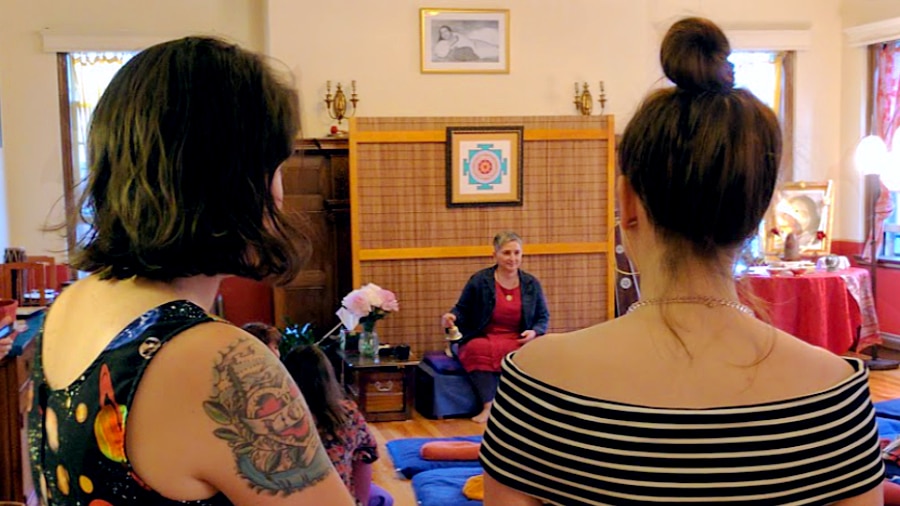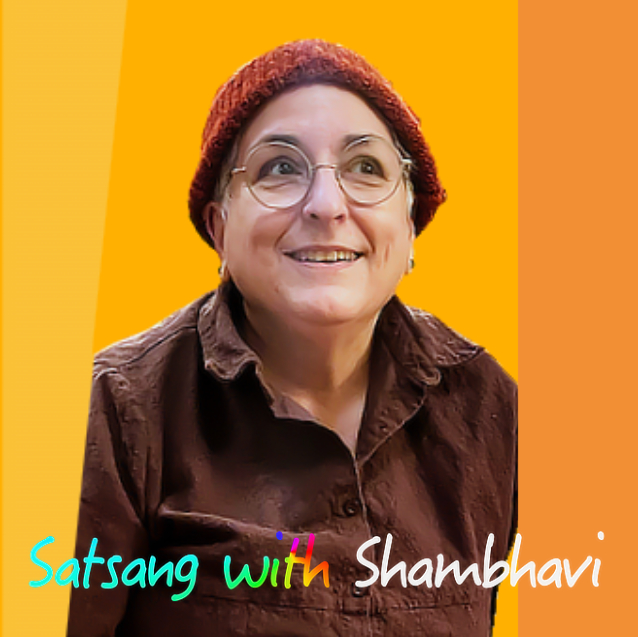Let go of striving and make the subtle effort to relax into non-conceptual life. A podcast from Satsang with Shambhavi
STUDENT 1: I was wondering if you could— you talk about this a lot, but like, the desire to be special or to be important or to be chosen, like that kind of flavor.
SHAMBHAVI: Mm-hmm. Well, it's like an addiction, you know? People chase it. People chase meaning and significance and importance, and yet our lives are just a flash.
And being individually important or chosen by someone. This is the origin, really, of why people get mixed up with horrible spiritual teachers is because those teachers know how to make you feel like you've been chosen, and you want that. And they make you feel important, right? And then they just do what they want with you.
So recognize that this chase⏤after being chosen and being wanted and being important and being significant, being meaningful⏤is basically eating up your whole life, laying waste to your life, and making you vulnerable to manipulation. And it's really not the purpose of a human life.
So if you think about it just in personal terms, it's kind of a big loss for you personally if this is how you spend your time and energy. And it leads you into situations that really aren't all that productive or healthy or pleasant.
So on a bigger scale, moving the frame out a little bit, it means that your energy is all self-focused. It's all about you. So even if you appear to be doing something for somebody else, you're basically just trying to hook them in some way. Or even if you appear to be doing something humanitarian, the energy is really flowing toward you and you wanting to be recognized or deemed important for it.
So when your orientation is being important, significant, meaningful, chosen, special, even just, like, wanting to make people love you⏤which is, like, another thing people spend a lot of time on⏤then whatever you're doing is the energy of that situation. You're sucking it in to yourself.
So what looks like something that you're doing that's helping other people or concern for other people is really somehow part of your whole seduction. So even though maybe somebody will be helped by what you do, no one's ever gonna get the whole benefit because you'll always be taking and reserving and sucking in some of the energy of that situation⏤ of your whole life.
If we move the frame out further, the whole thing just becomes ludicrous because you're so infinitesimal in relationship to everything that is and all beings. If you actually wanted to be important or chosen, literally it's like a proton saying it wanted to be chosen by an electron. You know, that's how big it is among the bazillions of electrons and protons.
So the whole thing is basically you running in this karmic circle and maybe pulling other people into your particular circle. And then a bunch of people get in the same thing. A lot of the situations I've been in my life, like circles of artists or circles of spiritual teachers, they're just like mutual back-patting societies.
They're all, like, promoting each other. And what is that about? What is that really about? So from my perspective, this is just a fantastical waste of energy.
And what we could be doing with our time and energy instead of that is so much more wonderful. You know, what if I said you are my favorite student! I have chosen you to be my dharma heir!
You would still feel all the things you feel, right? It's not gonna solve your problem. I mean, you might be thinking yes it will, [laughs] secretly, but I guarantee you it wouldn't. Because the fact of who you really are, what you really are, is not revealed by just being chosen by somebody.
And the idea is that we want to spend our time and energy seeking revelation of what is the nature of the Self and of reality so that we can really play here. So that we can enjoy these fleeting lives that we have and even play with the zones between lives. And just have a magical, grand old time.
That's really the whole thing. That's what God is doing. So if we're doing anything else, it's adharmic.
And it's exhausting. So many people are exhausted by the search for respect, esteem, recognition, being chosen, being secure, being important, doing something significant, feeling like you're on the bus. People spend their entire lives doing that, their body, energy, and mind totally wrapped up in that chase.
And they're literally running on fumes, they're so exhausted spiritually and physically and emotionally. And of course, this is very particular to our culture too. People relax more in a lot of other cultures. They spend more time doing nothing and just hanging out and are not so focused on this individualistic striving for some kind of self-validating success.
When you leave this country and you go some other places, you realize oh, you know, you can feel the relaxation pretty much in the air. It just feels better to be there in a lot of other countries because⏤ we're, like, in a gulag of self-concern, right?
You can't believe how artificial it seems from the outside watching everybody do this. To most of the people here, it feels natural and normal. Well, of course I should strive for this and that and demand respect and blah di blah, right? Demand recognition, try to be chosen!
How many people approach spiritual teachers trying to be the one, trying to manipulate and seduce the teacher into being the chosen student. What a waste. That's just such a waste. You're supposed to be here for your own realization, not to magnetize people just like you do everywhere else.
So that's my 14,327th talk about why we shouldn't be concerned about importance. [laughs] I have to say it is a little different every time, which is pretty astounding.
STUDENT 2: I have a follow-up question of you using the word striving. Sounds like that is not the practitioner's go-to attitude in the ideal sense. But then the Shamatha attitude is not too tight, not too loose. What is the word if it's not striving?
SHAMBHAVI: Well, not striving for accomplishment. You can't strive unless you think you know what you're striving for, right? You have to have an an object of your strivation. So you've already lost the game then. If you think you know what it is you're striving for.
And then god forbid you should get that thing because then you'll be satisfied. You know, somebody has an idea of⏤this is very common in this kind of tradition⏤I want my kundalini to rise! You've read about it in a book, maybe you've watched a few videos, maybe you've gone to some class and hyperventilated and felt tingly.
You know, I don't know. You've done these things. But you have this idea, and you have an idea, because you've read a lot about it or talked to people about it, of what it should feel like and what should happen. And then something happens that you label as kundalini rising, and that's it. You're satisfied.
Then you just keep trying to have that experience, whatever that was, which was completely of your own and other people's limited imagining. And then you're done, right? This is why you read so many people online saying I'm enlightened. It's like, really? There've never been so many enlightened people in all of human history!
Because they have defined it in a certain way as a particular goal, a particular kind of experience, and then they have that experience, and they think that's it. It never is it. Ever. There is not one experience that's it.
So let's just put the word effort. The effort is the subtle effort to get out of the way of yourself, basically.
Of course we make effort if we're doing a certain kind of mantra or doing some sort of internal kriya or puja, you know, we're moving things around. I mean, effort is happening, right? So it's not like we're supposed to just be like wet noodles, you know?
But when we're doing Shamatha or nonconceptual meditation, the idea is that we're just relaxing. There's like a subtle effort to relax, and that relaxation is basically getting out of the way so we can experience nonconceptual life.
And there's no one that can really tell you how to do that. It is effort. But it's not striving for the goal. It's just getting out of the way so life can appear in its fullness.
STUDENT 2: Can we take a more down-to-earth example, which will be I'm having a hard time doing my daily practice for the last couple days. I'm not sleeping well.
SHAMBHAVI: Oh. [Expresses sympathy]
STUDENT 2: So what's the right effort in coming back to that place where practice resumes again with the normal rhythm? Like is that striving to want to come back to that?
SHAMBHAVI: No, not at all. That's desire. Your desire. You should let your desire roar if it ever can. No, that's not striving, but you feel desire, so you're making an effort to follow that desire.
This is like if we're tired, or we're sick, or we're a little uncomfortable, we have a body pain, or we're really overloaded at work, or we just had a fight with our spouse, or some things that get in the way of⏤ it's too cold, it's too hot, it's too rainy, it's too snowy, it's too sunny. You know, whatever we think. Then there's resistance, right? Resistance happens.
So we make effort to overcome that resistance. But the source of that effort is desire because somewhere in you, you have the desire. And you have already recognized oh, this is gonna help me to experience things in a different way, and I want that.
So the effort isn't like a dry, heartless effort, although it might feel like that sometimes. But even when it does feel like that, you wouldn't do it if you didn't have the desire.
Nobody does anything without desire. So even if you don't want to practice, like not you but someone, and the only reason you're doing it is cause you have a crush on someone in the community that you wanna impress, that's still a desire, right? Maybe it's not, like, the most exalted desire, but if it gets you practicing, why not?
So sometimes people have this feeling like they're either forcing themselves to do something, or they're being forced. But the truth is, in either of those situations, you may feel that you have to put a lot of effort into getting yourself to the cushion, but behind it is always your desire.
This is what we have to own to be mature practitioners. All of us experience resistance, and we all have hard times when it's harder to get to the cushion for whatever reason. And this is just completely normal. We all have doubts, that's completely normal.
But at the core of it, if we're gonna keep practicing, has to be this desire and ownership of that desire. You have to recognize it and say yes, I know this about myself.
So that even if everything's just swirling around, there's this kind of still point, which is really like a flame, that's like okay, I know this about myself. I have this desire. This is what I want despite all of the other crap. So we have to not only feel the desire, but we have to not disown it. We have to actually recognize it and own it, and that is crucial.
STUDENT 3: I have a strong desire to practice or to attend satsang, and that's why I'm here now, but I also have strong desires for other things which I think would be beneficial to the world, let's say developing my business.
SHAMBHAVI: Mm-hmm.
STUDENT 3: What I feel conflicted or worried about is that it's somehow not in line with my desire to wake up a bit more. Oh, am I developing my business just for self-recognition, even though I think I'm helping other people? I feel a little confused at times.
SHAMBHAVI: Mm-hmm. A lot of people have this question. And sometimes it boils down to I have this spiritual yearning, but I don't want to be too weird. I want to be normal. I want to lead a normal life and have people think I'm normal and I don't want to be too unconventional.
So sometimes behind this is that kind of a fear. But what is really the truth about this situation is the more you wake up, the more loving you're gonna be. The more compassionate, the more precise, the more skillful, the more intelligent, the more creative, and the more beneficial.
Let's just say for argument's sake that whatever you think of as God is totally awake. So does that mean that God is less beneficial to people because God is totally⏤ you know, it doesn't make sense, right? Is the Dalai Lama less beneficial because he is not running a business?
When you wake up, you become more beneficial. Whether you're running a business or raising a family or growing food or being a car mechanic or being a checkout person or being a writer or being whatever you are, spiritual life is not in conflict with everyday life. It is not in conflict.
What spiritual practice means, if you decide to devote any amount of time to it, is that you're gonna be more effective, more open, and more compassionate in every area of your life, including your business.
And if there's anything about how you're engaging in the business world right now that is about self-aggrandizement or being seen in a certain way by other people, if you do spiritual practice over years and years, that will no longer be your reason for being in business.
The balance will shift, you'll be there more to help people, not less. So there's absolutely nothing selfish about doing spiritual practice. And there's nothing in conflict with everyday life about doing spiritual practice. It will change the way that you engage in everyday life, but it'll make you a more effective participant in life, not less effective.
So you don't really have anything to be afraid of, which unfortunately means that you have nothing to stop you from doing spiritual practice. [laughs]
Sign up to receive email updates
Enter your name and email address below and I'll send you periodic updates about the podcast.


